A Summer Seminar curated by Aneta Rostkowska, Nada Rosa Schroer and Julia Haarmann.
In recent years there has been a proliferation of art exhibitions on plants and ecology accompanied by a fascination with indigenous thinking and various forms of collective work in art institutions. At the same time, there has been a growing disillusionment with the art world itself: For example, in its lack of solidarity, exploitative working conditions, short-term funding paired with shrinking structural support, a superficial understanding of diversity, strong hierarchical structures at art institutions, compulsive self-branding or the cult of mobility and flexibility. The art system perfectly mimics the neoliberal economy that we all live in. Our disappointment, however, often does not translate into concrete actions – “neoliberal art realism” (a term inspired by Mark Fisher’s “capitalist realism”) permeates everything as the sense that the status quo of the art world is the only viable one and it is impossible to imagine an alternative to it.
On the other hand, the intensifying climate change makes it clear that the economy and society cannot continue in the same way as they used to. The ecological catastrophe that we are now facing triggers a strong impulse and need for change. In response, this seminar will use ecological thinking to reflect differently about the workings of the art world, and especially in different types of art institutions. We will bring in the teachings of plants and permaculture that has mostly functioned as exhibition content into the structures of our work, in order to inform our curatorial practices. How can the ethics of permaculture (earthcare, peoplecare and fairshare) inspire a lasting transformation of art institutions beyond the superficial application of ecological guidelines? Can the regenerative aspect of permacultural thinking be transformed into a regenerative philosophy of an art institution? Could this thinking translate to sustainable community-based practices focused on emancipatory forms of working together and collective care for ecological and social commons?
The seminar involved discussions in a closed group of practitioners, artists and curators, as well as public events accessible online throughout the week as well as in the form of a public day (Saturday, July 16) on site.

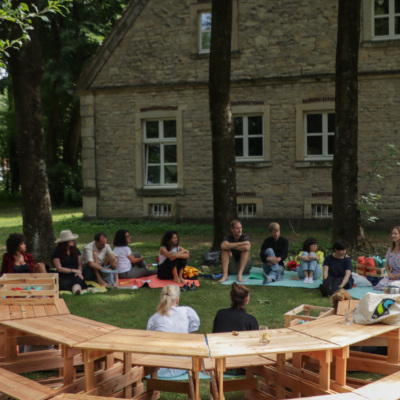








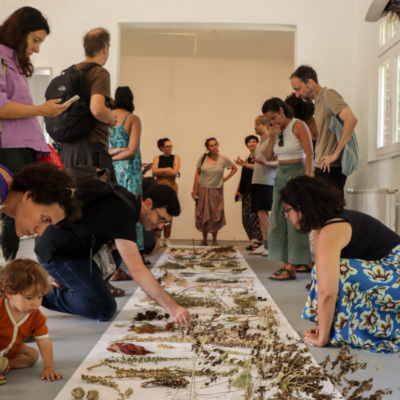







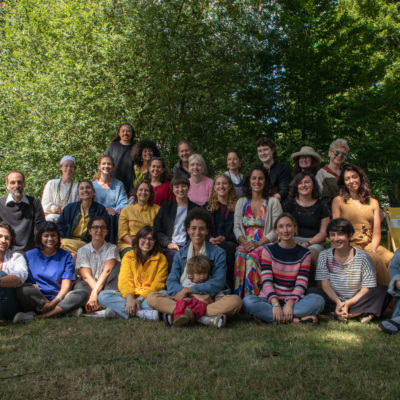







Participants:
Art Residency Research Collective (Pau Catà/ Morag Iles/ Miriam La Rosa/ Patricia Healy McMeans/ Angela Serino), Giulia Bellinetti, Felipe Castelblanco, Viviana Checchia, Culture for Climate (Ewa Chomicka/ Anna Czaban), Madeleine Collie, Clelia Coussonnet , Alfred Decker, T.J. Demos, Marianna Dobkowska, Maja Fowkes & Reuben Fowkes, Yoeri Guépin, Michael Marder, Riya Matthew, Lola Malavasi Lachner, Anna Melnykova, Paloma Nana, Sour Grass (Annalee Davis/ Holly Bynoe), Ela Spalding, Stéphane Verlet Bottéro.
Community cooking by Paula Erstmann.
Lectures / Workshops / Seminars:
Community Brunch
July 17, 12 – 4 pm CET
Michael Marder:
Toward Material Sustainabilities. Perspectival Meditations
July 13, 2 – 3:30 pm CET
In this talk, I consider how the world of vegetation undergirds, makes possible, and, indeed, sustains the thinking and the practices of sustainability. I argue that plants possess intrinsic value, irreducible to the instrumental rationality that often dovetails with discourses of sustainability. The meaning of the intrinsic value of plants lies not so much in what they are in themselves as in what they are for themselves, at the limits of human understanding. I then suggest that this vegetal perspective on the world, which puts into question the anthropocentric idea of truth, may join a cross-species and cross-kingdoms „community of values“ with human environmental practices that would treat other living beings not as objects of concern but as partners in sustainable living.
Sour Grass:
The Grounds We Nurture
July 14, 10 – 11:30 am CET
Sour Grass instigators Holly Bynoe and Annalee Davis will present an overview of their individual and collective practices as artists, curators and activists interrogating aspects of emergent cultural ecologies across the Caribbean space. From a post-colonial perspective, they examine notions of scarcity and orphanhood, presenting models that counter historical violence. Notions of hospitality, care, healing, wellness and community are reflected in their collaborative approaches. This session will open with the serving of three unique teas using plants from the Scottish Highlands and Barbados and close with an invitation to participate in brewing cocoa tea using beans and ingredients from St. Vincent & The Grenadines.
T.J. Demos:
Climate Aesthetics as Class War
July 16, 5 – 6:30 pm CET
As we struggle for a livable world amidst capitalist ruination, it’s impossible to ignore that climate change is class war. While the ruling class profits from fossil capital, working people worldwide suffer the military violence, rising heat, and associated life-destroying socio-environmental impacts. How can we rethink aesthetics and politics on this basis, including artistic institutions and collective practice? To build ecosocialism on a warming planet—as the necessary resolve to racial and colonial capitalism—requires organizing: what does that look like today within a thoroughly neoliberal art system?
recording from „Eco-operations workshop“, July 22, 2022, documenta Institut in collaboration with Universität Kassel and Universität Zürich
https://youtu.be/YnQwr6WMUOU
Maja and Reuben Fowkes:
The Self-Management of Plants
July 17, 9:30 – 11:30 am CET
Climate shocks are shaking up human-plant relations, dispelling wilful ignorance towards the multi-dimensionality of vegetal life, disrupting the rationale of input-based agriculture and unsettling the ethos of cultivation in order to restore attentiveness to the resilience, unruliness and reparative power of plants. Artistic rapprochements to the vegetal world reveal the otherness, vitality and ingenuity of botanical lifeforms, but also articulate a plant-centric critique of social and economic systems. To what extent can parallels be drawn between grassroots organisational forms based on democratic and egalitarian principles and the self-management of ruderal plants? How might embracing the agency of pioneering plants and letting go of the taxonomic superiority complex of hierarchical kingdoms provide a way forward for art institutions in search of permacultural models?

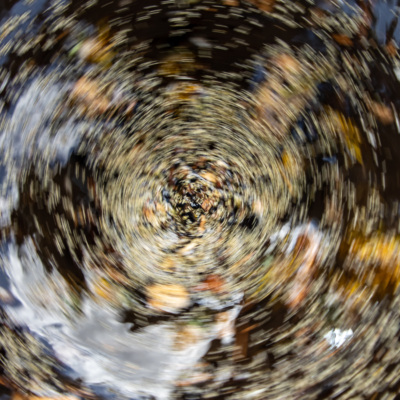



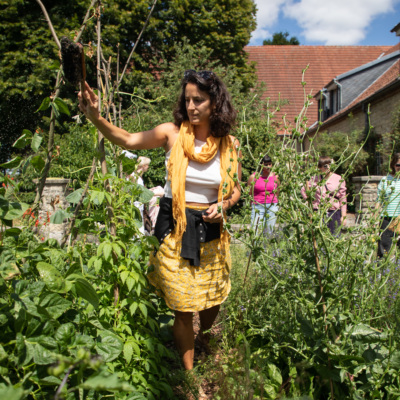




Yoeri Guépin:
Cooking for microbes. Changing the microbiome of extractive capitalism
July 16, 10 am – 1 pm CET
What goes on in the microcosm of the soil seems to follow an archetypical plot. The soil is populated with a trillion tiny microorganisms, including soil bacteria, which can be roughly divided into three camps: The „good“, the „bad“ and the “opportunists”. Good bacteria develop symbiotic partnerships with plants (the mutualists) or break down pesticides and pollutants and are nutrient repositories (the decomposers). Bad bacteria can cause rot and disease (the pathogens). The rest of the bacteria choose the side that is more powerful at the moment.
As a result of chemical fertilizers and pesticides industrial agriculture under Capitalism has created the ideal conditions for the domination of pathogenic bacteria in agriculture soils, which require more sanitization with pesticides in a downwards spiral of treating one evil with another.
It’s a small step from the transformation of soil under capitalism, to thinking about ourselves and our microbiome which operates according to the same principles. What does regeneration means if we apply the principle of soil to ourselves? How can we regenerate the soil and equally create healthy environments for ourselves and our environment?
In the workshop we will first examine and analyze different soil conditions. The next step is to learn how to use free available materials and improvised technologies to cook a nourishing meal for bacteria that regenerate the soil. Together we’ll build, brew and mix ingredients that create conditions for balanced and biodiverse soil ecosystems.
The seminar was developed in collaboration with the CCA Temporary Gallery / Cologne (temporarygallery.org). It is part of the CAP (Curating for Advanced Practices) program of the Stiftung Künstlerdorf Schöppingen. CAP aims to develop new strategies and structures in the arts and for artistic practices and negotiate their implementation and production conditions.
With kind support by the Kunststiftung NRW, the Friends of the Künstlerdorf Schöppingen Association and the International Visitors Programme of the NRW KULTURsekretariat (Wuppertal).
